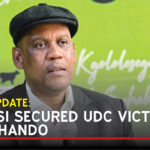Four alleged fraudsters oppose summons, one goes missing
Four out of the five directors and employees of the disgraced Bluthorn Fund Managers firm (BFM) have indicated their intention to oppose the summons issued against them to pay back the P240 Million to the investors they allegedly defrauded five years ago.
Eune Engelbrecht, Joseph Mosimane, Motlamedi Matome and Jeffery Sibisibi have responded to summons issued by Liquidator KopanangThekiso, while the fifth director, Tiyedzi Kamodi has not been served yet, since her whereabouts are unknown, The Voice has learnt.
At the end of the High Court Inquest that commenced in 2021, the Liquidator ruled that the five were liable to pay back approximately P240 million to local authorities, being the funds invested in BFM between 2018 and 2020.
“You are hereby commanded that within 14 days after service of this Summons on you, inclusive of the day of such service, you do cause an appearance to be entered for you in the action at the suit of liquidator of consolidated estates of Bluthorn Fund Managers, Prime Employee Benefits, Bluthorn Procurement Solutions, Bluthorn Holdings, and Bluthorn [Pty) Ltd,” reads the Summons from Armstrongs Attorneys issued last week.
The five individuals who are linked to the companies either as Directors or employees are accused of encouraging unsuspecting investors to purchase shares from BFM in order for it to invest the funds with the provision of the Collective Investment Undertakings Act.
The liquidator has since found that BFM was not complying with financial services law, and maybe involved in financial crimes.
The Inquiry was held on various dates in 2022, and 2023 and found that the Defendants acted recklessly; breached their fiduciary duties; contravened the Companies Act; and were in charge of the formation and running of the business of the group companies.
“The Plaintiff seeks to recover various amounts which were initially invested by the creditors in BFM, due to the Defendants and are therefore liable to Plaintiff in the total amount of P239 880 724.32,” reads the summons further.
The Inquest has found that there were no boundaries between the five companies, and no compliance with corporate governance guidelines. The five defendants were either directors in one company and officers in another company and made decisions which resulted in the loss of the funds.
Close to P240 million was distributed and spent through these companies via loans, and advances to several outside companies. There was no due diligence in issuing such loans and the employees were neither trained nor possessed experience in the business.
“The companies were set up as separate legal entities for legal and regulatory purposes only. However, in reality they were managed and controlled as a single entity, without any segregation between them. The setup of the companies in the Group was such that the various companies could be regarded as divisions or department within the company being BFM, with BFM taking deposits, and PEB and BPS being the retail end of the business,” says the liquidator.
Meanwhile during the inquest Engelbrecht had said if given a chance he would recover the funds, whilst Sibisibi was adamant that he has done nothing wrong.
“My story has not changed and I have nothing to comment,” Sibisibi said when reached for comment on Wednesday.
The exact financial transactions will be verified during trial.
The Money trail According to Inquest findings
Total of 26 Investors made up of several district councils, land boards, and other government departments poured in approximately P290 million between January 2018 and November 2019 in a bid to boost their revenues with interest from the investments. It is not yet known how much was paid back to each of the investors.
Some of the investors
District Councils – Letlhakeng Sub. South East District, Mahalapye Sub, Kgalagadi, Ghanzi, Mogoditshane/Thamaga Sub, Gaborone City Council, Southern, Tlokweng Sub, Hukuntsi Sub, Tonota Sub, Kanye Administrative Authority, as well as Malete and Tlokweng land boards.
Some of the subdistricts have since become fully fledged district councils

















